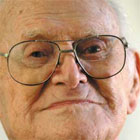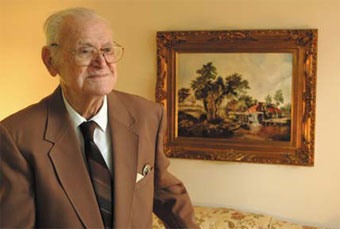| Q&A with UTA's oldest living graduate | Alumni as college presidents | Recognition of contributors |
 |
||
| Home Forethought Campus Buzz Feature Stories Re:Search The Score Alum News Yesteryear | ||
 As far as anyone knows, L.G. Meier is the oldest living alumnus of The Shorthorn, the University’s award-winning campus newspaper. He was student business manager there in 1929, when the paper celebrated its 10-year anniversary. More recently, he was a guest of honor at the paper’s 85th anniversary and reunion last October. Meier, who turned 97 in January, attended North Texas Agricultural College (now UTA) in 1928-29 and earned an associate of science degree. Staff writer Danny Woodward sat down with him at his Dallas apartment last September.
As far as anyone knows, L.G. Meier is the oldest living alumnus of The Shorthorn, the University’s award-winning campus newspaper. He was student business manager there in 1929, when the paper celebrated its 10-year anniversary. More recently, he was a guest of honor at the paper’s 85th anniversary and reunion last October. Meier, who turned 97 in January, attended North Texas Agricultural College (now UTA) in 1928-29 and earned an associate of science degree. Staff writer Danny Woodward sat down with him at his Dallas apartment last September.
Danny Woodward: I’ve got to ask, what does L.G. stand for?
L.G. Meier: My given name is Lorenz Godfred. But my friends for years, since I traveled a lot, they called me “Long Gone.” L.G. was “Long Gone,” and I still have some friends who call me Long Gone Meier.
DW: Where did you grow up?
LGM: Mount Pleasant, over in East Texas. I graduated from Mount Pleasant High School. They ran my picture in the newspaper when I left for college. I was 19 years old.
DW: Why did you come to NTAC?
LGM: It was the military school. Of course, I was too young to fight in World War I and too old to fight in the Second World War.
DW: Besides The Shorthorn, what activities were you involved in at NTAC?
LGM: I played on the golf team, and I was in the glee club. My girlfriend was in the glee club, too. That’s her right there in the front, I think [pointing to a photograph].
DW: Weren’t you on the football team?
LGM: Yes. We had two teams, and we had this old field we used to play on off campus. We’d bring the other teams there. But I don’t think we were very good in those days.
DW: What position did you play?
LGM: I used to run with the ball. But I didn’t play very much. I was just on the football team because it was something else to do.
DW: Did you have a job the year before you worked at The Shorthorn?
LGM: I used to work at the campus eatery. When they found out I was coming to NTAC and that I used to work in my father’s bakery back home, the dean told them to hire me. He told them not to tell anyone but to pay me twice as much as everyone else was making. They all made like a quarter an hour, and I made 50 cents because I had experience.
DW: If you didn’t have a background in journalism, how did you come to work at The Shorthorn?
LGM: The dean of the business school appointed me business manager. He knew me and I guess he liked me, so he made me the business manager. I was a good student. That surprised me when they came up with the fact that they wanted me to take over The Shorthorn. But evidently I did a good job, from what they said later. Some years later, the dean gave a talk at the Rotary Club and said he wouldn’t mention any names, but they liked me better than other guys. They said I was the best business manager they ever had up until that time.
DW: Which dean was this?
LGM: I don’t know if it was [George] Dickey or [E.E] Davis.
DW: There’s no such position as student business manager at The Shorthorn these days. What did it mean in 1929?
LGM: I sold the ads for the newspaper. They furnished me with a mailbox over there in Fish Hall, and I got my mail and things for The Shorthorn. I called on stores in Dallas and Fort Worth both [to sell the ads], but I’d hitchhike back and forth to go talk to them. Once, I was going to Fort Worth. Somewhere out on the highway, a man picked me up to go to Fort Worth, and he wanted to know what I did. I told him. He gave me his address and said he was in the lumber business, or some business. He said, “You come out to see me and I’ll give you an ad.”
|
|
| L.G. "Long Gone" Meier got his nickname because he traveled a lot. Now 97, he sold ads for The Shorthorn in the late 1920s and was the newspaper's guest of honor at its 85th anniversary and reunion last October. |
DW: That was a different time. What was daily life like on the NTAC campus in 1929?
LGM: We lived in the dormitory my second year there. There was a woman who lived across the street from the dormitory with two little kids that made their living by taking and doing our washings. She’d send the little boy over there with a little red wagon and gather up the clothes and take them over to her house. And in addition to listing our clothes, we’d put in how many bottles of home brew we wanted. When he brought the clothes back to the dorm, there’d be a half-dozen bottles of home brew we’d ordered, added to the cost of the laundry!
DW: What would have happened if you got caught?
LGM: Well, they finally … they found out about her. The dean called me into his office. He said, “L.G., I hear that lady that does y’all’s washing is selling home brew to the boys. I’d like a boy to pose and go out there and buy some with a couple of officers hid down in the bushes.” And I said, “Dean, I’m not that kind of a man. You’re talking to the wrong man.” I said, “I’ll admit that I buy home brew from her. But I wouldn’t pull a thing like that because I’m just as guilty as she is.” And you know what? That made the biggest hit with the dean that I ever saw. But they caught her. They got some boy to go over there and do it with the officers in the bushes.
DW: What happened after you graduated from NTAC? Did you go on to a university?
LGM: I went over there to SMU for a while and some other places. I went to about a half-dozen different colleges because I wanted a better education. They should have given me a bachelor’s degree just because I went to so many places and took so many courses.
DW: What business were you in?
LGM: I worked for a publishing company, selling their magazines. My area was the Mississippi River and west. I used to go to these events like the World’s Fair or the opening of Disneyland and get in and sell the magazines there. It was great because they’d fly us around for free. My wife and I took a lot of trips to New Orleans and Las Vegas and California. But it was hard work.
DW: Did you keep in contact with any of your old Shorthorn buddies?
LGM: No. I think I’m the only one left now.
DW: What about any of your NTAC classmates?
LGM: I went to a meeting out there [during the 1995 Centennial observance]. There were only three of us from the same year I was present.
I imagine that the other two are gone by now. I bet I’m the last of the ’29 graduates out there.
DW: Do you still have any memorabilia from your NTAC days?
LGM: One day when my son was up here from San Antonio, since he was the keeper of my estate, I gave him my bound copy of The Shorthorn with my name printed across the top. On the bottom of it was “business manager” and the year that I was business manager. I gave it to him, and he took it back to San Antonio with him.
DW: Did you enjoy your time at NTAC?
LGM: Oh, very much so. I enjoyed it more than anything.
— Danny Woodward
| Archives
| Alumni Association |
Giving to UTA | UTA
Home Copyright © 2005 UTA Magazine. All rights reserved. |
